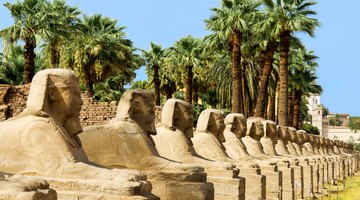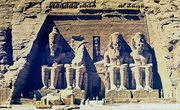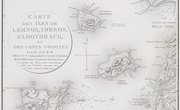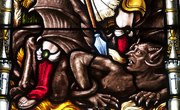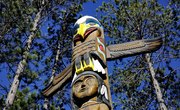When it comes to power, few rulers had more of it than the pharaohs of Egypt. Pharaohs functioned as both the religious and political leader of the country and were also known as the "High Priest of Every Temple" and the "Lord of the Two Lands," referring to Upper Egypt and Lower Egypt. The people believed that pharaohs had received all of their authority directly from the gods. Certain religious, political and symbolic duties were associated with Egyptian pharaohs.
Establishing and Enforcing Laws
Pharaohs were absolute monarchs that were called kings regardless of gender. The title of "pharaoh" was not used to reference the king until about 1450 BCE. As supreme rulers, pharaohs were responsible for the creation and enforcement of all laws governing the land. Pharaohs also served as supreme commanders of Egypt's military. While pharaohs did have advisors who helped guide them, they answered to no one and were solely responsible for any and all decisions that affected the kingdom.
High Priest of Every Temple
As "High Priests of Every Temple," pharaohs functioned as earthly representation of the gods. In order to honor the gods, pharaohs were responsible for constructing temples and performing sacred rituals. Pharaohs determined religion for the Egyptian peoples. The nation was, for the most part, polytheistic until Pharaoh Akhenaten's reign. Pharaoh Akhenaten designated Egypt as a monotheistic land and attempted to make the people worship a god called Amen. However, after Akhenaten's death, Egypt returned to its past polytheistic beliefs.
Lord of the Two Lands
Another title bestowed upon pharaohs was "Lord of the Two Lands," which was accompanied by additional responsibilities. As "Lords of the Two Lands," pharaohs were responsible for politically ruling Egypt and had to fulfill obligations such as handling legal disputes and commanding the army. Pharaoh Menes established a unified Egyptian state by the combining both Upper and Lower Egypt under one monarchy.
Father of the Land
The pharaohs of Ancient Egypt also served as symbolic fathers of the land and were seen as responsible for making sure the citizens had an adequate food supply. Since pharaohs were considered to be gods on earth, they could allegedly control the Nile River's floods that fertilized the surrounding farmland. Pharaohs were also believed to be directly related to Ra, the sun god, which made them obliged to care for the Egyptian peoples in the same way that a father cares for his offspring. Because of all of this strong symbolism, the power that pharaohs had was essentially without limits.

